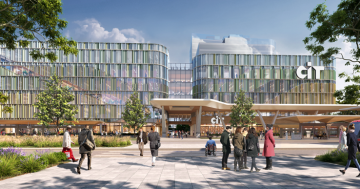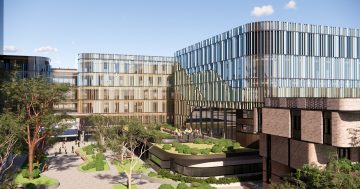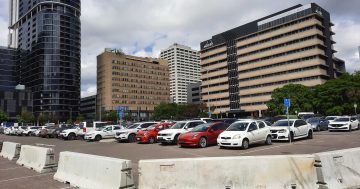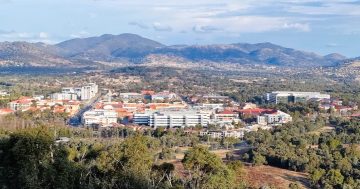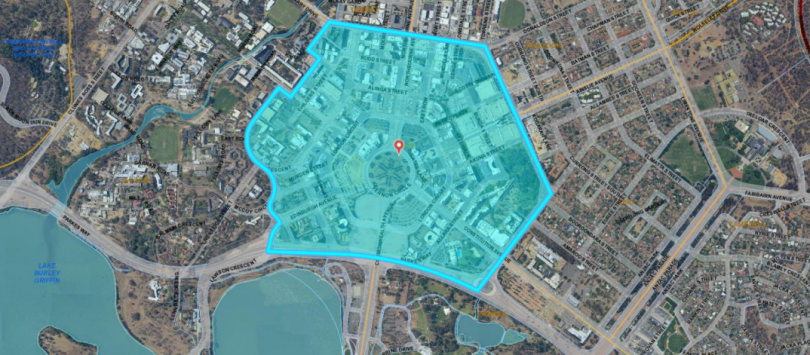
The search zone as identified for new offices for the Department of Education, Skills and Employment, and the AEC. Image: Colliers.
The map above is the reason why some ACT Town Centres fear they may lapse into being just ‘dormitory’ suburbs.
The map identifies Canberra city as the search zone for where new offices for the Department of Education, Skills and Employment, and the Australian Electoral Commission could be located.
Colliers International issued a Request for Expressions of Interest to the market last November, seeking A-grade office space that may include a new build, refurbished building or an existing building.
But the site would be limited to a central location, ignoring the decentralised design of the capital and Town Centres in need of stronger jobs bases.
Gungahlin has been crying out for more commercial space in its Town Centre for years, but the overwhelming majority of new developments have been residential towers with a small amount of groundfloor retail or hospitality.
It has been promised the 300-strong Defence Housing Australia agency, announced with much fanfare in 2018, and staff are due to move in next year.
But an anchor department such as the Department of Social Services in Tuggeranong and the Australian Bureau of Statistics in Belconnen still eludes the Town Centre.
Federal departments have abandoned the Woden Town Centre where available space is being snapped up for apartments, and even the Lovett Tower is being refurbished for residential use.
Gungahlin Community Council president Peter Elford said that for federal departments such as DESE, currently located at 50 Marcus Clarke Street, it was all about the physical location and not wanting to upset staff.
”They don’t want to cause a ruckus by moving the agency from the city and upsetting staff,” he said. ”They want to be close to the central agencies and that ends up dragging them into the circle.”
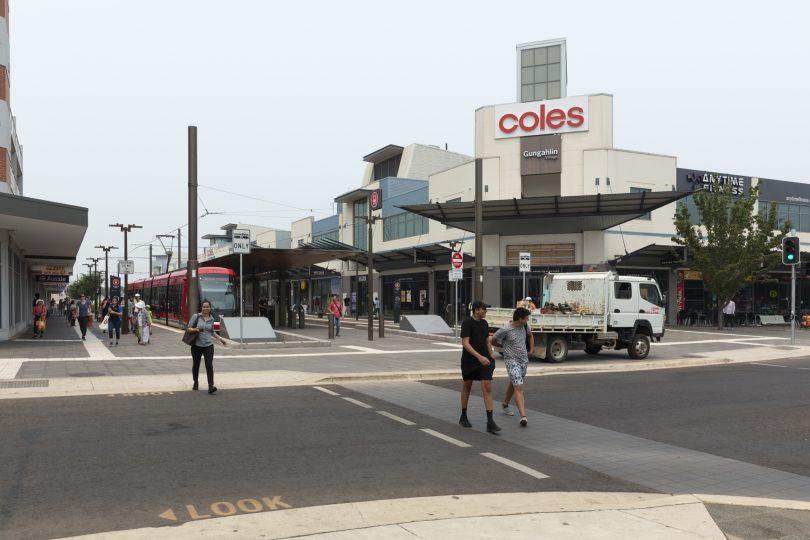
Gungahlin Town Centre: community still hoping for a big government employer. Photo: Region Media.
But that turns the notion of Town Centres and employment distributed across the various districts on its head.
Mr Elford said there has been very little Federal Government investment in the Town Centres since self-government, and there did not appear to be any strategy for how the ACT’s districts will develop, other than leaving it to market forces.
”Are we still building our districts to be a mix of employment and residential, recreation and community?” he asked.
Mr Elford said incentives, including a peppercorn rent for UNSW to establish a city campus on the Reid CIT site, show government can intervene to achieve an outcome.
He said the community still holds out hope that a major agency or department will be established in Gungahlin.
”The unwritten assumption of most residents is that one day there will be a big office block with 5000 people,” he said.
But he fears the proliferation of multi-unit development in the Town Centre and progressive versions of the Precinct Code are reducing the amount of space available for commercial office development.
”How does that build a town centre?” Mr Elford said. “Can you show me a town centre anywhere in the world that has very little employment, and mostly residential, that works?”
Woden Valley Community Council president Fiona Carrick said that without jobs Town Centres become dormitories or places where people just pass through.
But planning decisions need to support employers by providing great public spaces for people to enjoy, Ms Carrick said.
Ms Carrick added that the Federal Government should be working with the ACT Government to improve residents’ quality of life by enabling the Town Centres to deliver services and be the social and economic hubs that they were intended to be.
”It is important to have employment in your Town Centre because it brings people and activity to these strategic hubs that support services and social and economic activity across Canberra,” she said.
Town Centres also provide large employers with great access to labour, and can reduce congestion by limiting the need to travel to the city centre, she said.
”The Federal Government should be working with the ACT Government to improve the quality of life of residents by enabling the Town Centres to deliver services and be the social and economic hubs that they were intended to be,” she said.
Yerrabi MLA Suzanne Orr said Canberra needed a clear commitment from the Federal Government to prioritise investment in all Town Centres, but Gungahlin had many advantages.
”Gungahlin has a lot to offer. We have a growing population keen to see our Town Centre grow, great transport links including light rail and new office accommodation that is of the highest standard,” she said.
A DESE spokesperson said the department’s office leases would expire during 2024 and 2025, and the department had specified ACT accommodation within the Canberra CBD in order to maintain proximity to Parliament and other government departments.
The REOI has closed, and the shortlisting of responses is due to be completed by 1 March.













